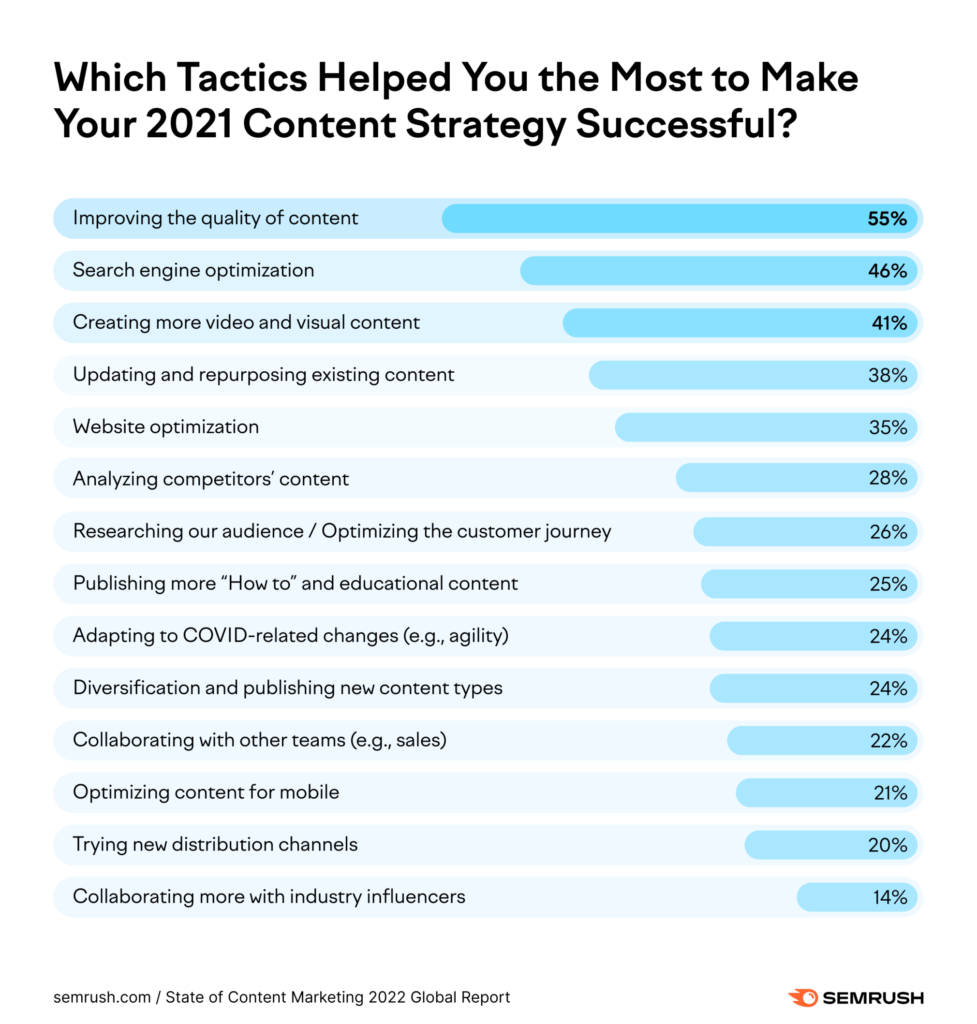Content planning is the process of organising, scheduling, and creating content for a specific purpose or audience. It involves identifying the target audience, setting goals and objectives, researching and brainstorming ideas, creating a content calendar, and measuring the success of the content. It is an important part of any content marketing strategy, as it helps ensure that the content created is relevant, useful, and aligned with overall business goals.
Why do small businesses need content planning?
Small businesses need content planning for several reasons:
- Targeted marketing: By identifying the target audience and creating content that is relevant and useful to them, small businesses can more effectively reach and engage their desired customer base.
- Branding: Consistently creating and sharing high-quality content can help establish a small business as an industry leader and build trust with its audience.
- Search engine optimisation: Well-planned and executed content can improve a website’s search engine rankings, making it easier for potential customers to find the business online.
- Cost-effective: Developing a content plan can help small businesses make the most of their limited resources by ensuring that content is created and shared strategically and efficiently.
- Competitive advantage: Small businesses that invest in content planning and marketing can stand out from their competition and gain a competitive advantage in their industry.
Honestly, content planning is a critical aspect of any small business’ marketing strategy, helping to increase visibility, reach new customers, and establish the business as an authority in its field.
Why do larger organisations need content planning?

Larger organisations need content planning for similar reasons as small businesses but on a larger scale. Here are a few key reasons:
- Aligning content with overall business goals: A content plan helps larger organisations ensure that all of their content is aligned with their overall business goals, such as increasing brand awareness, generating leads, or driving sales.
- Managing multiple teams and channels: Larger organisations often have multiple teams and channels producing content, so a content plan helps them coordinate and align their efforts to ensure consistency and efficiency.
- Maximising resources: A content plan helps larger organisations make the most of their resources by identifying the most effective channels and formats for their content and focusing their efforts accordingly.
- Measuring ROI: A content plan can help larger organisations track the performance of their content and measure the return on investment (ROI) of their content marketing efforts. ‘Content marketing generates three times as many leads as traditional outbound marketing but costs 62% less.’
- Staying competitive: Larger organisations face a lot of competition, and a content plan helps them stay ahead of the curve by identifying industry trends and creating content that is relevant, engaging, and valuable to their target audience.
Content planning is crucial for larger organisations to ensure the alignment of their content efforts to their overall business goals, efficiently manage the production process and optimise the use of resources, measure the success of their content marketing efforts and to stay competitive.
‘78% of those who believe their content marketing was very successful in 2021 had a documented content marketing strategy,’ states SEMrush’s content marketing report. With most marketers finding that their content planning tactics that provided the most success were improving the quality of their content and improving the SEO.

How content planning can enhance your branding
Content planning can enhance branding in several ways:
- Consistency: A content plan ensures that all of a company’s content is aligned with its brand message and tone, which helps to build trust and credibility with its audience.
- Relevance: By understanding the target audience and creating content that is relevant and useful to them, a company can establish itself as an authority in its industry and build a strong relationship with its audience.
- Unique voice: A content plan allows a company to develop and maintain a unique brand voice that sets it apart from its competitors and helps it to stand out in the marketplace.
- Storytelling: A content plan can help a company tell its story and communicate the values and mission that are at the heart of its brand.
- Brand awareness: A well-executed content plan can increase brand awareness by reaching a larger audience and making it easier for potential customers to find and learn about the company.
- Brand loyalty: By consistently providing valuable and relevant content, a company can build a loyal audience that is more likely to become customers and recommend the brand to others.
It’s really an important aspect of branding, as it helps companies to effectively communicate their message, build trust and credibility with their audience, and establish themselves as leaders in their industry. I always encourage my clients to undertake rigorous content planning, particularly at the start of the year.
How can content planning be more cost-effective for your business?
Content planning can be more cost effective for a business in several ways:
- Prioritisation: A content plan allows a business to prioritise the most critical topics and channels for their content, ensuring that resources are used effectively.
- Repurposing: A content plan allows a business to repurpose existing content in new ways, such as turning a blog post into a video or a webinar, which can save time and money.
- Efficiency: A content plan allows a business to streamline its content creation process, reducing the need for multiple revisions and editing, and ultimately saving time and money.
- Budgeting: A content plan helps a business to set realistic budgets and timelines for content creation, which can help the business to avoid overspending on content creation. Particularly when it comes to last-minute or rush jobs to get something done. For example, if you remember the day before an event you’re hosting that you need a photographer to capture content for your social media, you’re likely going to incur a rush rate fee.
- Measuring ROI: A content plan can help a business to track the performance of its content and measure the return on investment (ROI) of their content marketing efforts, which can inform future budgeting decisions.
- Smart outsourcing: A content plan allows a business to identify which tasks can be outsourced to external experts, which can save time and money. Did you know that ‘Half of all marketers say they outsource some content marketing.’
How does content planning advance SEO?
Content planning can improve SEO in several ways:
- Relevance: A content plan helps to ensure that a business is creating content that is relevant and useful to its target audience, which can improve the relevance and authority of the website in the eyes of search engines.
- Keyword research: A content plan includes keyword research, which helps a business to identify the keywords and phrases that are most relevant to its target audience and industry. By including these keywords in its content, a business can improve its website’s visibility in search engine results.
- Quality content: A content plan helps a business to create high-quality content that is valuable to its audience. Search engines prioritise high-quality, informative content in their search results.
- Consistency: A content plan helps a business to create and publish content on a regular basis, which can help to establish the business as an authority in its industry and improve its website’s visibility in search engine results.
- Internal linking: A content plan allows a business to strategically link its content internally, which can help search engines to better understand the structure and relevance of the website.
- Social media integration: A content plan can also include a social media strategy, which can help a business to drive traffic to its website and improve its search engine visibility.
Overall, a well-executed content plan can help a business to create high-quality, relevant, and keyword-optimised content that can improve its website’s visibility and search engine rankings.
How can you start content planning?
Starting content planning involves several steps:
- Identify your goals and objectives: Clearly define what you want to achieve with your content, such as increasing brand awareness, generating leads, or driving sales.
- Understand your target audience: Research your target audience and create buyer personas to understand their needs, interests, and pain points. If you’ve been reading my blog for a while, you’ll know that I’m always banging on about identifying your target audience as a first step. This can end up saving a lot of money in the long run.
- Research and brainstorm ideas: Research your industry and competition to identify gaps in the market and generate ideas for content that will be valuable to your target audience.
- Create a content calendar: Organise your ideas into a content calendar, including the topics, channels, and formats for your content, as well as the schedule for creation and distribution. I have a practical editorial plan template for you.
- Set metrics for success: Determine the metrics you will use to measure the success of your content, such as website traffic, engagement, and conversions. Make them realistic to start with so you don’t feel disheartened when you’re not reaching unattainable goals in the early stages.
- Create and execute: Create and execute your content, following your content calendar and metrics for success. Find out which process works best for you or your organisation. Do you like to batch content and write a heap of blog posts in one day? Or do you prefer to set aside half a day a week to write and publish a blog post?
- Monitor and adjust: Regularly monitor the performance of your content and adjust your content plan as needed to ensure that it is aligned with your goals and objectives and resonating with your target audience.
It’s important to note that content planning is an ongoing process, and it needs to be reviewed and adjusted regularly to ensure that it’s aligned with the business goals and audience needs.
Here’s what I do:
I base all my marketing around my blog content (with the objective of selling my marketing and copywriting services, blogging course and books – so everything needs to point back to them). I choose to blog because that’s my love, I know it’s effective for me (especially in terms of SEO), and it plays to my strengths.
Then, I base all my other marketing around that. My social media, email marketing and paid ads generally feed back to my blog posts (or my website, depending on what I’m promoting).
My blog content is primarily based on SEO keywords (I do a mixture of blogging, copywriting, digital marketing keywords and occasionally words related to my books). But I also focus my content on answering questions that my community or potential clients may have. Or that will help them achieve their marketing, blogging or writing goals.

I actually do my content plan every quarter, as well as an annual strategy. Do I always stick to it? No! Because client work always takes priority, so I plan as if I am able to dedicate consistent time to my content marketing and then just end up doing what I can.
Even though my SEO is pretty consistent for me at the moment, I figure that I can never have enough blog content, so I will often focus my efforts on building more and more. I encourage others to do the same, especially if you are interested in building on your SEO.




